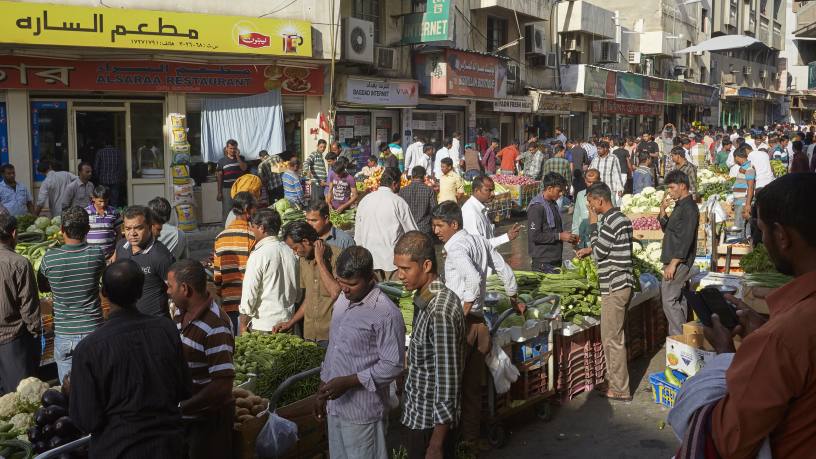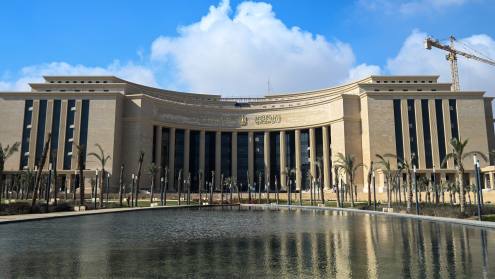Bahrain’s economy enjoyed a standout year in 2022. Higher oil prices and strong activity in key sectors, including tourism and construction, drove real gross domestic product (GDP) growth above 6%, according to Fitch Ratings, well above forecasts by the International Monetary Fund (see chart). For many private and public sector leaders, this outcome marks a watershed moment in the country’s recovery from the Covid-19 pandemic. But as the world, and Bahrain, moves on from the economic lows of recent years, a new set of challenges and opportunities are facing the government in Manama.
For one, the urgency of transitioning the economy away from oil is building, as Bahrain’s public finances deteriorate and a greener global future beckons. Though hydrocarbons account for only 18% of GDP, the sector generates about 75% of government revenues. The problem facing Bahrain’s government is that its proven oil reserves are low and the cost of extraction is high. And although the country has taken significant strides to diversify its economy over the past two decades, there is more work to be done.
In 2021, the government unveiled an economic recovery plan designed, in part, to accelerate Bahrain’s drive to a less oil-dependent future. The plan includes $30bn worth of strategic investments, new targets to attract foreign direct investment (FDI) and goals to increase the employment of Bahraini nationals in the workforce, among other initiatives. Moreover, the government underscored its focus on six priority sectors for the future, namely tourism and logistics, financial services, telecommunications, IT and the digital economy, manufacturing, and oil and gas.
It is hoped this plan will drive the country towards its Vision 2030 goal of, in the government’s words, a “productive, globally competitive economy, shaped by the government and driven by the private sector”. In this sense, the economy’s trajectory in 2022 may offer the authorities some early hope: non-oil growth ticked along at a 7.2% annualised rate over the first three quarters of the year, according to data from Tamkeen, the national labour fund, even if it was partly supported by government spending.
“The real standout for Bahrain in 2022 was the performance of the non-oil economy, which recovered really strongly. Output is now above the pre-pandemic level and this reflects the government’s ability to recycle oil revenues back into the economy,” says John Payne, a senior economist at Oxford Economics. “Bahrain’s plan seems to be to get the private sector stimulated and get businesses interested in the economy. And that will help the government achieve the 2030 target of being no longer reliant on oil and having a wider fiscal base.”
Rocky road ahead
In the short term, however, the road to this objective may get rockier for the government. Economic growth is projected to fall over the next 12 months, as lower oil prices take their toll on the wider economy.
“This year is going to be a difficult year for Bahrain. We’re expecting growth to halve, and that is a combination of weaknesses in both the oil and non-oil sector,” says Mr Payne.
Over the medium term, however, there are reasons to be optimistic. In a world characterised by geopolitical tensions, heightened macroeconomic uncertainties and the rise of new digital economies, Bahrain is presenting itself as a stable, open and pro-business destination to cultivate economic opportunities. In particular, the country is looking to turbocharge FDI across its priority sectors.
According to Khalid Humaidan, CEO of the Bahrain Economic Development Board (EDB), FDI inflows are robust. “The most recent full-year FDI [inflow figures are for] 2021, when there was an increase in FDI in Bahrain of $1.7bn — that’s a very strong number. The total value of Bahrain’s FDI stock is around $35bn, so for it to grow close to $2bn in a single year is very good,” he says.
These inflows are most evident in Bahrain’s financial services sector, which accounts for the largest non-oil portion of the country’s GDP. The Bahrain EDB is looking to capitalise on this inherent strength to attract further investments and boost the sector’s total contribution to the economy from about 17.8% to above 20%. Notable achievements to date include Citi’s 2021 decision to locate a Global Technology Hub in the country, which is on track to hire 1000 coders by the end of 2023. The importance of Bahrain’s financial services sector to its future is a widely shared view across the country today.
“We expect Bahrain to maintain its position as a major financial player in the Middle East, supported by many factors, including prudent legislation and excellent supervision by the Central Bank of Bahrain, that ensure financial sector stability and sustainability,” says Waheed Al Qassim, CEO of the Bahrain Association of Banks.
But in an evolving financial services landscape, Bahrain is also willing to embrace innovative new technologies and business models. This includes digital assets, which the authorities in Manama view as an opportunity for the country. In January 2023, global crypto exchange Binance launched its platform in Bahrain, after receiving approvals from the central bank and Bahrain EDB. In the wake of 2022’s crypto annus horribilis — which saw multiple high-profile bankruptcies and a slump in crypto asset prices — there is a general belief that the sector should only be embraced if it is accompanied by a strong regulatory framework.
“The crypto winter has made one thing very clear: the need for regulation,” says Mr Humaidan. “Binance is one of many companies that we’re engaging with. We know the sector will continue to be disruptive and we want to engage with new and existing players.
“Good governance is important, compliance is important and consumer protection is important. As long as those three elements are incorporated in business plans, we welcome businesses to come and establish themselves here, even if they are disruptive,” he says.
Tech hub
This approach is mirrored in the way that Bahrain has dealt with companies across a wide spectrum of the digital economy. In particular, the country is working hard to position itself as a cloud computing and data hub for the wider Middle East and north Africa region. In 2019, the government signed a deal with Amazon Web Services, in a regional first, to host the company’s data centres. But Bahrain went a step further, by partnering with the US tech giant to improve its regulatory framework for data-centric and cloud computing operations.
“When AWS was looking for a country to base their first hyperscale data centre in the Middle East, we engaged with them, and we asked them what would make Bahrain more attractive?” says Mr Humaidan.
The result was the introduction of Bahrain’s “Data Embassy Law” in 2018, that allows foreign actors to establish data centres in the country while maintaining the legal jurisdiction of their home country over that data. “If an American company is storing their data in Bahrain, only a US court has jurisdiction over that data. And that became the Data Embassy Law,” says Mr Humaidan.
If an American company is storing their data in Bahrain, only a US court has jurisdiction over that data
“A big part of Bahrain’s investment pipeline is more data centres. We have local players building data centres, we have regional players building data centres and we have international players building data centres. It’s a real opportunity,” he adds.
Looking ahead, Bahrain will have to maintain this success in order to achieve its development objectives, with significant structural economic challenges facing the country in the coming years. For one, the state of its public finances is an ever-present concern. The country’s government debt-to-GDP ratio is forecast to hit 124% in 2024, according to Fitch Ratings, while its fiscal position is equally precarious: the general government budget deficit is expected to reach 4.1% of GDP in 2023, up from 3.6% in 2022, according to Fitch.
Despite the government creating a fiscal balance programme within its broader recovery agenda, several economists doubt the country’s ability to hit the key objective of achieving fiscal balance by 2024.
“We estimate the budget break-even price of oil is $125 per barrel. That’s a very weak starting position and it’s why we expect Bahrain to still have a fairly wide deficit. We don’t think the government will reach their fiscal targets, despite the probability of some significant fiscal consolidation taking place over the next few years,” says Cedric Berry, director of sovereign ratings at Fitch.
Filling the coffers
To its credit, the government of Bahrain has accelerated efforts to widen its fiscal revenue base by doubling the rate of value-added tax in 2022 from 5% to 10%. The introduction of other fees, charges and potential subsidy reforms are expected over the coming year.
“It appears that it may be a question of when, rather than if, Bahrain will introduce corporate tax,” said Mubeen Khadir, head of tax and corporate services at KPMG Fakhro in Bahrain in a recent note.
Meanwhile, the upgrade of the country’s massive Bapco refinery, which will see production rise from the current level of around 240,000 barrels per day to about 400,000 barrels per day by early 2025, should also fill the government’s coffers. It will also help with its non-oil economic agenda, since refining operations are classed as non-oil economic activity by the authorities.
Despite such boosts, Bahrain will continue leaning on budget transfers from its Gulf Co-operation Council (GCC) peers to steady its public finances. In October 2018, Saudi Arabia, Kuwait and the UAE agreed to supply Bahrain with $10bn in fiscal support in increments over the following years. Under the agreement, Bahrain is required to adjust its fiscal position to achieve complete sustainability of its public finances. For the moment, the package of support is continuing.
“The figure we have for GCC budget transfers to Bahrain was close to $1.5bn in 2022, but we expect that to taper a little bit in 2023 and 2024,” says Mr Berry.
Ongoing and difficult fiscal reforms could start to bear fruit over the medium term, though much will depend on the country’s ability to stay the course on potentially unpopular reforms. Other changes to the economy, including the increasing participation of Bahraini nationals in the workforce, will also help to propel Bahrain towards its long-term goals. Maintaining the country’s openness to foreign investments, as well as its responsiveness to the needs of the private sector, will be vital.
Even so, Bahrain is not alone in the region in terms of its desire to court international investment. Across the GCC in particular, the country is surrounded by energy superpowers, and relative demographic giants, meaning the most difficult task facing the country may be the effort required to keep its competitive advantages in a crowded field.
“There’s a lot of regional competition on top of global competition with very attractive places such as Dubai. So it’s going to be difficult for Bahrain to distinguish itself as a business hub,” says Mr Berry.












